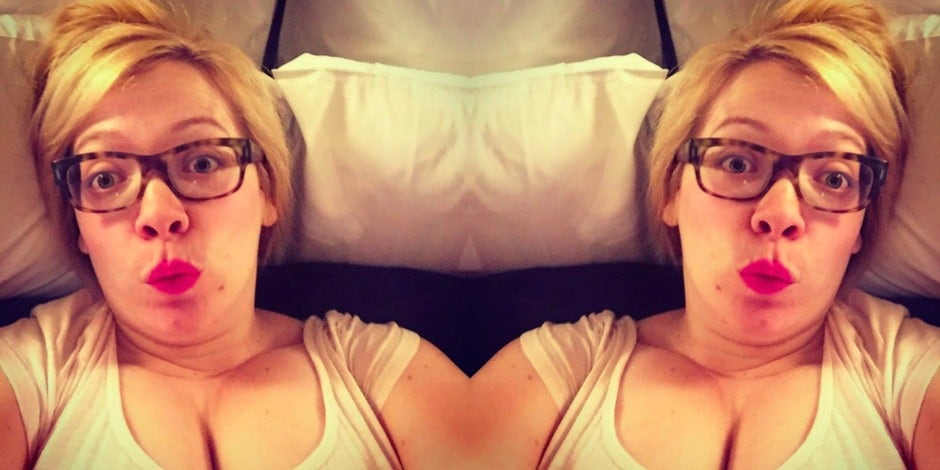I Hated My Big Boobs Until I Was Forced To Face A Life Without Them
Now I see my big boobs as a beautiful part of my identity.
 Courtesy of the Author
Courtesy of the Author I have always had big boobs.
Big boobs are just such a huge part (pun not intended but hilarious) of my identity, even if I don't always think of them in that respect.
The only memory that comes close to being one when I had no boobs was during my preteen years as my boobs began to develop.
Over the kitchen table, my mom narrowed her eyes staring at my chest. "The left one is smaller than the right," she said. It took me a second to figure out what she meant, and when I finally did I was devastated to discover that our kitchen floor lacked the ability to open up and swallow me whole.

(me on the far left with a stuffed bunny, fanny pack, pleated shorts, and full D cup)
As a pre-teen and an adolescent, my big boobs were incongruous hindrances. I hated still having Mickey Mouse on my glasses but being fitted to wear a bra by a woman who could have been my grandmother. I learned about coverage and support before I was thirteen.
It was like I bypassed all the fun parts of having a rack. I didn't want to flaunt my boobs, I just wanted to hide them. I'd slouch constantly (to my mother's annoyance) and when a man on the street would shout out something about them I would feel a tremendous wave of shame wash over me.
They didn't even look right. I saw boobs on TV in movies and magazines and they were all deemed sexy and beautiful. They looked nothing like my chest lumps.
Even in high school, I thought of my big boobs as dumpy and chubby, not sexy curves. I went to school dances looking like a very straight-laced Amish woman which is cool, except I so wasn't Amish.
(me second from the right, tastefully distracting attention from my boobs WITH A NECK SCARF FOR SOME REASON)
It made shopping for clothes difficult, too. If I wanted to be comfortable, I had to hide my boobs. But if I wanted to dress like the other girls in my school it meant I had to risk being called a slut or a whore. I tried to beat people to the punchline, making fun of my own boobs.
I named them, gave them deep goofy voices, and let people manhandle them like they had nothing to do with me. It was comedy as a coping mechanism.
Shopping for my senior prom dress was a nightmare. Anything I liked seemed too revealing. After a hot sweaty day of shopping, I lost my temper. "I don't see what the big deal is about boobs anyway! They are flaps of fat! These annoying sacks!"
Driving beside me my mother's silence took on another tone. She had recently undergone a mastectomy after being diagnosed with breast cancer.
I was completely embarrassed by my own behavior. I apologized, and she just smiled but I could tell she was sad.
My mom successfully recovered from breast cancer and eventually decided to do the BRCA testing to determine whether or not my sister and I were at higher risk for breast cancer.
While we waited for the results I wondered what they would mean for me. I know that Angelina Jolie made the courageous decision to get a double mastectomy in light of her own mother's struggle and I wondered if I would do that as well.
I was surprised to find that while I feared death, I was floored at the notion of losing the breasts I had complained about my entire life.
A tough day shopping for a prom dress was one thing, but what about breastfeeding my future children? What about the attention? Sure, some were negative but what about the gentle feel of a lover's hand cupping my breast in his hand?
The idea of these being gone forever made me weep.
Testing determined that my mother's cancer wasn't hereditary. Still, because of her experience, I am considered high risk and I started getting mammograms early. Like so many things, it took facing the idea that I might lose them to make me realize just how central my breasts had become to my identity.
As a girl who spent her life hating her own body it was surprising in a great way to discover that somewhere along the line I had grown to love my breasts. If I could love one part of me, surely the rest would come with time.
Rebecca Jane Stokes is the former Senior Editor of Pop Culture at Newsweek with a passion for lifestyle, geek news, and true crime.

